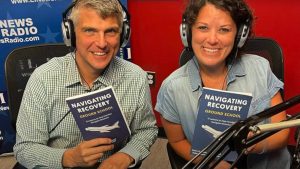
Today, in a 12 Step meeting, I am introducing myself, “Hi, my name is Adam, and I am an alcoholic.”
At this point, I’m comfortable with defining myself as a former alcoholic because I know that that is just one part of mu identity. I have introduced myself as such on numerous occasions; it is a commonality that I share with the other members of my support group. But I also identify with many other titles, such as father, son, pilot, recovery professional, and business partner.
I can understand why some people don’t want to define themselves with this word, filled with negative connotation. However, for me, it was a relief. It allowed me to finally understand and address the root of my problems, including my anxiety and depression. Diagnosing myself as an alcoholic liberated me.
About Adam Banks
Adam Banks is a certified interventionist and the owner of Adam Banks Recovery. After receiving an MBA from the University of Chicago, Adam built a company acquired by United Health Care. His discipline and attention to detail comes from his former career as an airline pilot, holding an ATP, the FAA’s highest license.
Today, Adam is dedicated to helping others achieve long-term sobriety. His work has guided executives, pilots, and physicians on paths to recovery. Adam brings families together through a loving and inclusive approach.
Adam has authored four books on addiction. His recent work, Navigating Recovery Ground School: 12 Lessons to Help Families Navigate Recovery, educates families on the entire intervention process. He also offers a free video course for families considering an intervention for a loved one.
Adam is available for alcohol and drug intervention services in New York, Long Island, the Hamptons as well as nationally and internationally.
It was easier to blame my addiction on the external world than to delve into myself and uncover the root of my unhappiness, which was directly linked to alcoholism. I would never define myself as an alcoholic.
Today, in a 12 Step meeting, I am introducing myself, “Hi, my name is Adam, and I am an alcoholic.”
At this point, I’m comfortable with defining myself as a former alcoholic because I know that that is just one part of mu identity. I have introduced myself as such on numerous occasions; it is a commonality that I share with the other members of my support group. But I also identify with many other titles, such as father, son, pilot, recovery professional, and business partner.
I can understand why some people don’t want to define themselves with this word, filled with negative connotation. However, for me, it was a relief. It allowed me to finally understand and address the root of my problems, including my anxiety and depression. Diagnosing myself as an alcoholic liberated me.
About Adam Banks
Adam Banks is a certified interventionist and the owner of Adam Banks Recovery. After receiving an MBA from the University of Chicago, Adam built a company acquired by United Health Care. His discipline and attention to detail comes from his former career as an airline pilot, holding an ATP, the FAA’s highest license.
Today, Adam is dedicated to helping others achieve long-term sobriety. His work has guided executives, pilots, and physicians on paths to recovery. Adam brings families together through a loving and inclusive approach.
Adam has authored four books on addiction. His recent work, Navigating Recovery Ground School: 12 Lessons to Help Families Navigate Recovery, educates families on the entire intervention process. He also offers a free video course for families considering an intervention for a loved one.
Adam is available for alcohol and drug intervention services in New York, Long Island, the Hamptons as well as nationally and internationally.
For years, I struggled with this. Unknowingly, I had built a group of friends that supported my addiction, took jobs that enabled it, and lied to doctors and therapists about my use. I wasn’t ready to address my problems. I wanted to hold onto my drinking.
Hi, I’m Adam and I’m an alcoholic
It was easier to blame my addiction on the external world than to delve into myself and uncover the root of my unhappiness, which was directly linked to alcoholism. I would never define myself as an alcoholic.
Today, in a 12 Step meeting, I am introducing myself, “Hi, my name is Adam, and I am an alcoholic.”
At this point, I’m comfortable with defining myself as a former alcoholic because I know that that is just one part of mu identity. I have introduced myself as such on numerous occasions; it is a commonality that I share with the other members of my support group. But I also identify with many other titles, such as father, son, pilot, recovery professional, and business partner.
I can understand why some people don’t want to define themselves with this word, filled with negative connotation. However, for me, it was a relief. It allowed me to finally understand and address the root of my problems, including my anxiety and depression. Diagnosing myself as an alcoholic liberated me.
About Adam Banks
Adam Banks is a certified interventionist and the owner of Adam Banks Recovery. After receiving an MBA from the University of Chicago, Adam built a company acquired by United Health Care. His discipline and attention to detail comes from his former career as an airline pilot, holding an ATP, the FAA’s highest license.
Today, Adam is dedicated to helping others achieve long-term sobriety. His work has guided executives, pilots, and physicians on paths to recovery. Adam brings families together through a loving and inclusive approach.
Adam has authored four books on addiction. His recent work, Navigating Recovery Ground School: 12 Lessons to Help Families Navigate Recovery, educates families on the entire intervention process. He also offers a free video course for families considering an intervention for a loved one.
Adam is available for alcohol and drug intervention services in New York, Long Island, the Hamptons as well as nationally and internationally.
Drugs and alcohol cloud our ability to accurately assess consequences. If you find it difficult to be objective about your situation, try to imagine how a friend, or loved one would answer these questions on your behalf
For years, I struggled with this. Unknowingly, I had built a group of friends that supported my addiction, took jobs that enabled it, and lied to doctors and therapists about my use. I wasn’t ready to address my problems. I wanted to hold onto my drinking.
Hi, I’m Adam and I’m an alcoholic
It was easier to blame my addiction on the external world than to delve into myself and uncover the root of my unhappiness, which was directly linked to alcoholism. I would never define myself as an alcoholic.
Today, in a 12 Step meeting, I am introducing myself, “Hi, my name is Adam, and I am an alcoholic.”
At this point, I’m comfortable with defining myself as a former alcoholic because I know that that is just one part of mu identity. I have introduced myself as such on numerous occasions; it is a commonality that I share with the other members of my support group. But I also identify with many other titles, such as father, son, pilot, recovery professional, and business partner.
I can understand why some people don’t want to define themselves with this word, filled with negative connotation. However, for me, it was a relief. It allowed me to finally understand and address the root of my problems, including my anxiety and depression. Diagnosing myself as an alcoholic liberated me.
About Adam Banks
Adam Banks is a certified interventionist and the owner of Adam Banks Recovery. After receiving an MBA from the University of Chicago, Adam built a company acquired by United Health Care. His discipline and attention to detail comes from his former career as an airline pilot, holding an ATP, the FAA’s highest license.
Today, Adam is dedicated to helping others achieve long-term sobriety. His work has guided executives, pilots, and physicians on paths to recovery. Adam brings families together through a loving and inclusive approach.
Adam has authored four books on addiction. His recent work, Navigating Recovery Ground School: 12 Lessons to Help Families Navigate Recovery, educates families on the entire intervention process. He also offers a free video course for families considering an intervention for a loved one.
Adam is available for alcohol and drug intervention services in New York, Long Island, the Hamptons as well as nationally and internationally.
- Are you happy?
- Do you have depression and/or anxiety?
- Have you sought treatment or medications for your condition?
- Do you look forward to using substances (e.g., after work drinks, weekends out)?
- Do you have problems at work? Do you get along with your boss/co-workers?
- Are you able to handle your parental or partner-related duties?
- Do you argue with your partner, family, or friends frequently?
- Do you consistently wake up feeling sick or fatigued?
- Do you use substances to fall asleep?
- Are you in the physical shape that you would like to be in?
- Do you engage in sports or hobbies?
- Do you ever not remember the night before?
- Have you isolated yourself or lied to cover up your use?
- How many times a month do you use?
Drugs and alcohol cloud our ability to accurately assess consequences. If you find it difficult to be objective about your situation, try to imagine how a friend, or loved one would answer these questions on your behalf
For years, I struggled with this. Unknowingly, I had built a group of friends that supported my addiction, took jobs that enabled it, and lied to doctors and therapists about my use. I wasn’t ready to address my problems. I wanted to hold onto my drinking.
Hi, I’m Adam and I’m an alcoholic
It was easier to blame my addiction on the external world than to delve into myself and uncover the root of my unhappiness, which was directly linked to alcoholism. I would never define myself as an alcoholic.
Today, in a 12 Step meeting, I am introducing myself, “Hi, my name is Adam, and I am an alcoholic.”
At this point, I’m comfortable with defining myself as a former alcoholic because I know that that is just one part of mu identity. I have introduced myself as such on numerous occasions; it is a commonality that I share with the other members of my support group. But I also identify with many other titles, such as father, son, pilot, recovery professional, and business partner.
I can understand why some people don’t want to define themselves with this word, filled with negative connotation. However, for me, it was a relief. It allowed me to finally understand and address the root of my problems, including my anxiety and depression. Diagnosing myself as an alcoholic liberated me.
About Adam Banks
Adam Banks is a certified interventionist and the owner of Adam Banks Recovery. After receiving an MBA from the University of Chicago, Adam built a company acquired by United Health Care. His discipline and attention to detail comes from his former career as an airline pilot, holding an ATP, the FAA’s highest license.
Today, Adam is dedicated to helping others achieve long-term sobriety. His work has guided executives, pilots, and physicians on paths to recovery. Adam brings families together through a loving and inclusive approach.
Adam has authored four books on addiction. His recent work, Navigating Recovery Ground School: 12 Lessons to Help Families Navigate Recovery, educates families on the entire intervention process. He also offers a free video course for families considering an intervention for a loved one.
Adam is available for alcohol and drug intervention services in New York, Long Island, the Hamptons as well as nationally and internationally.
Think you might be an addict? Here’s a few questions to ask yourself
- Are you happy?
- Do you have depression and/or anxiety?
- Have you sought treatment or medications for your condition?
- Do you look forward to using substances (e.g., after work drinks, weekends out)?
- Do you have problems at work? Do you get along with your boss/co-workers?
- Are you able to handle your parental or partner-related duties?
- Do you argue with your partner, family, or friends frequently?
- Do you consistently wake up feeling sick or fatigued?
- Do you use substances to fall asleep?
- Are you in the physical shape that you would like to be in?
- Do you engage in sports or hobbies?
- Do you ever not remember the night before?
- Have you isolated yourself or lied to cover up your use?
- How many times a month do you use?
Drugs and alcohol cloud our ability to accurately assess consequences. If you find it difficult to be objective about your situation, try to imagine how a friend, or loved one would answer these questions on your behalf
For years, I struggled with this. Unknowingly, I had built a group of friends that supported my addiction, took jobs that enabled it, and lied to doctors and therapists about my use. I wasn’t ready to address my problems. I wanted to hold onto my drinking.
Hi, I’m Adam and I’m an alcoholic
It was easier to blame my addiction on the external world than to delve into myself and uncover the root of my unhappiness, which was directly linked to alcoholism. I would never define myself as an alcoholic.
Today, in a 12 Step meeting, I am introducing myself, “Hi, my name is Adam, and I am an alcoholic.”
At this point, I’m comfortable with defining myself as a former alcoholic because I know that that is just one part of mu identity. I have introduced myself as such on numerous occasions; it is a commonality that I share with the other members of my support group. But I also identify with many other titles, such as father, son, pilot, recovery professional, and business partner.
I can understand why some people don’t want to define themselves with this word, filled with negative connotation. However, for me, it was a relief. It allowed me to finally understand and address the root of my problems, including my anxiety and depression. Diagnosing myself as an alcoholic liberated me.
About Adam Banks
Adam Banks is a certified interventionist and the owner of Adam Banks Recovery. After receiving an MBA from the University of Chicago, Adam built a company acquired by United Health Care. His discipline and attention to detail comes from his former career as an airline pilot, holding an ATP, the FAA’s highest license.
Today, Adam is dedicated to helping others achieve long-term sobriety. His work has guided executives, pilots, and physicians on paths to recovery. Adam brings families together through a loving and inclusive approach.
Adam has authored four books on addiction. His recent work, Navigating Recovery Ground School: 12 Lessons to Help Families Navigate Recovery, educates families on the entire intervention process. He also offers a free video course for families considering an intervention for a loved one.
Adam is available for alcohol and drug intervention services in New York, Long Island, the Hamptons as well as nationally and internationally.
Most people that we work with classify themselves as “functional” users because they always make it to work and rarely take time off. Life is much deeper than maintaining a job.
Think you might be an addict? Here’s a few questions to ask yourself
- Are you happy?
- Do you have depression and/or anxiety?
- Have you sought treatment or medications for your condition?
- Do you look forward to using substances (e.g., after work drinks, weekends out)?
- Do you have problems at work? Do you get along with your boss/co-workers?
- Are you able to handle your parental or partner-related duties?
- Do you argue with your partner, family, or friends frequently?
- Do you consistently wake up feeling sick or fatigued?
- Do you use substances to fall asleep?
- Are you in the physical shape that you would like to be in?
- Do you engage in sports or hobbies?
- Do you ever not remember the night before?
- Have you isolated yourself or lied to cover up your use?
- How many times a month do you use?
Drugs and alcohol cloud our ability to accurately assess consequences. If you find it difficult to be objective about your situation, try to imagine how a friend, or loved one would answer these questions on your behalf
For years, I struggled with this. Unknowingly, I had built a group of friends that supported my addiction, took jobs that enabled it, and lied to doctors and therapists about my use. I wasn’t ready to address my problems. I wanted to hold onto my drinking.
Hi, I’m Adam and I’m an alcoholic
It was easier to blame my addiction on the external world than to delve into myself and uncover the root of my unhappiness, which was directly linked to alcoholism. I would never define myself as an alcoholic.
Today, in a 12 Step meeting, I am introducing myself, “Hi, my name is Adam, and I am an alcoholic.”
At this point, I’m comfortable with defining myself as a former alcoholic because I know that that is just one part of mu identity. I have introduced myself as such on numerous occasions; it is a commonality that I share with the other members of my support group. But I also identify with many other titles, such as father, son, pilot, recovery professional, and business partner.
I can understand why some people don’t want to define themselves with this word, filled with negative connotation. However, for me, it was a relief. It allowed me to finally understand and address the root of my problems, including my anxiety and depression. Diagnosing myself as an alcoholic liberated me.
About Adam Banks
Adam Banks is a certified interventionist and the owner of Adam Banks Recovery. After receiving an MBA from the University of Chicago, Adam built a company acquired by United Health Care. His discipline and attention to detail comes from his former career as an airline pilot, holding an ATP, the FAA’s highest license.
Today, Adam is dedicated to helping others achieve long-term sobriety. His work has guided executives, pilots, and physicians on paths to recovery. Adam brings families together through a loving and inclusive approach.
Adam has authored four books on addiction. His recent work, Navigating Recovery Ground School: 12 Lessons to Help Families Navigate Recovery, educates families on the entire intervention process. He also offers a free video course for families considering an intervention for a loved one.
Adam is available for alcohol and drug intervention services in New York, Long Island, the Hamptons as well as nationally and internationally.
There are many methods people use to distinguish themselves from others and detach from the label of “addict.” Instead of debating the label, people should ask themselves, truthfully, “Does my drinking cause negative impacts on my life?”
The myth of the functional alcoholic
Most people that we work with classify themselves as “functional” users because they always make it to work and rarely take time off. Life is much deeper than maintaining a job.
Think you might be an addict? Here’s a few questions to ask yourself
- Are you happy?
- Do you have depression and/or anxiety?
- Have you sought treatment or medications for your condition?
- Do you look forward to using substances (e.g., after work drinks, weekends out)?
- Do you have problems at work? Do you get along with your boss/co-workers?
- Are you able to handle your parental or partner-related duties?
- Do you argue with your partner, family, or friends frequently?
- Do you consistently wake up feeling sick or fatigued?
- Do you use substances to fall asleep?
- Are you in the physical shape that you would like to be in?
- Do you engage in sports or hobbies?
- Do you ever not remember the night before?
- Have you isolated yourself or lied to cover up your use?
- How many times a month do you use?
Drugs and alcohol cloud our ability to accurately assess consequences. If you find it difficult to be objective about your situation, try to imagine how a friend, or loved one would answer these questions on your behalf
For years, I struggled with this. Unknowingly, I had built a group of friends that supported my addiction, took jobs that enabled it, and lied to doctors and therapists about my use. I wasn’t ready to address my problems. I wanted to hold onto my drinking.
Hi, I’m Adam and I’m an alcoholic
It was easier to blame my addiction on the external world than to delve into myself and uncover the root of my unhappiness, which was directly linked to alcoholism. I would never define myself as an alcoholic.
Today, in a 12 Step meeting, I am introducing myself, “Hi, my name is Adam, and I am an alcoholic.”
At this point, I’m comfortable with defining myself as a former alcoholic because I know that that is just one part of mu identity. I have introduced myself as such on numerous occasions; it is a commonality that I share with the other members of my support group. But I also identify with many other titles, such as father, son, pilot, recovery professional, and business partner.
I can understand why some people don’t want to define themselves with this word, filled with negative connotation. However, for me, it was a relief. It allowed me to finally understand and address the root of my problems, including my anxiety and depression. Diagnosing myself as an alcoholic liberated me.
About Adam Banks
Adam Banks is a certified interventionist and the owner of Adam Banks Recovery. After receiving an MBA from the University of Chicago, Adam built a company acquired by United Health Care. His discipline and attention to detail comes from his former career as an airline pilot, holding an ATP, the FAA’s highest license.
Today, Adam is dedicated to helping others achieve long-term sobriety. His work has guided executives, pilots, and physicians on paths to recovery. Adam brings families together through a loving and inclusive approach.
Adam has authored four books on addiction. His recent work, Navigating Recovery Ground School: 12 Lessons to Help Families Navigate Recovery, educates families on the entire intervention process. He also offers a free video course for families considering an intervention for a loved one.
Adam is available for alcohol and drug intervention services in New York, Long Island, the Hamptons as well as nationally and internationally.
Making excuses for your drug use is a sign of addiction
When working with people with substance use disorder, they’re rarely willing to admit that they might have an addiction. In fact, they often go to great lengths to justify why they’re not. “I don’t drink as much as Joe, he’s the alcoholic!,” or “I’ve never done hard drugs!” My favorite, “Okay, I might drink too much, but at least I’m a functional alcoholic!” is a common retort.
There are many methods people use to distinguish themselves from others and detach from the label of “addict.” Instead of debating the label, people should ask themselves, truthfully, “Does my drinking cause negative impacts on my life?”
The myth of the functional alcoholic
Most people that we work with classify themselves as “functional” users because they always make it to work and rarely take time off. Life is much deeper than maintaining a job.
Think you might be an addict? Here’s a few questions to ask yourself
- Are you happy?
- Do you have depression and/or anxiety?
- Have you sought treatment or medications for your condition?
- Do you look forward to using substances (e.g., after work drinks, weekends out)?
- Do you have problems at work? Do you get along with your boss/co-workers?
- Are you able to handle your parental or partner-related duties?
- Do you argue with your partner, family, or friends frequently?
- Do you consistently wake up feeling sick or fatigued?
- Do you use substances to fall asleep?
- Are you in the physical shape that you would like to be in?
- Do you engage in sports or hobbies?
- Do you ever not remember the night before?
- Have you isolated yourself or lied to cover up your use?
- How many times a month do you use?
Drugs and alcohol cloud our ability to accurately assess consequences. If you find it difficult to be objective about your situation, try to imagine how a friend, or loved one would answer these questions on your behalf
For years, I struggled with this. Unknowingly, I had built a group of friends that supported my addiction, took jobs that enabled it, and lied to doctors and therapists about my use. I wasn’t ready to address my problems. I wanted to hold onto my drinking.
Hi, I’m Adam and I’m an alcoholic
It was easier to blame my addiction on the external world than to delve into myself and uncover the root of my unhappiness, which was directly linked to alcoholism. I would never define myself as an alcoholic.
Today, in a 12 Step meeting, I am introducing myself, “Hi, my name is Adam, and I am an alcoholic.”
At this point, I’m comfortable with defining myself as a former alcoholic because I know that that is just one part of mu identity. I have introduced myself as such on numerous occasions; it is a commonality that I share with the other members of my support group. But I also identify with many other titles, such as father, son, pilot, recovery professional, and business partner.
I can understand why some people don’t want to define themselves with this word, filled with negative connotation. However, for me, it was a relief. It allowed me to finally understand and address the root of my problems, including my anxiety and depression. Diagnosing myself as an alcoholic liberated me.
About Adam Banks
Adam Banks is a certified interventionist and the owner of Adam Banks Recovery. After receiving an MBA from the University of Chicago, Adam built a company acquired by United Health Care. His discipline and attention to detail comes from his former career as an airline pilot, holding an ATP, the FAA’s highest license.
Today, Adam is dedicated to helping others achieve long-term sobriety. His work has guided executives, pilots, and physicians on paths to recovery. Adam brings families together through a loving and inclusive approach.
Adam has authored four books on addiction. His recent work, Navigating Recovery Ground School: 12 Lessons to Help Families Navigate Recovery, educates families on the entire intervention process. He also offers a free video course for families considering an intervention for a loved one.
Adam is available for alcohol and drug intervention services in New York, Long Island, the Hamptons as well as nationally and internationally.




